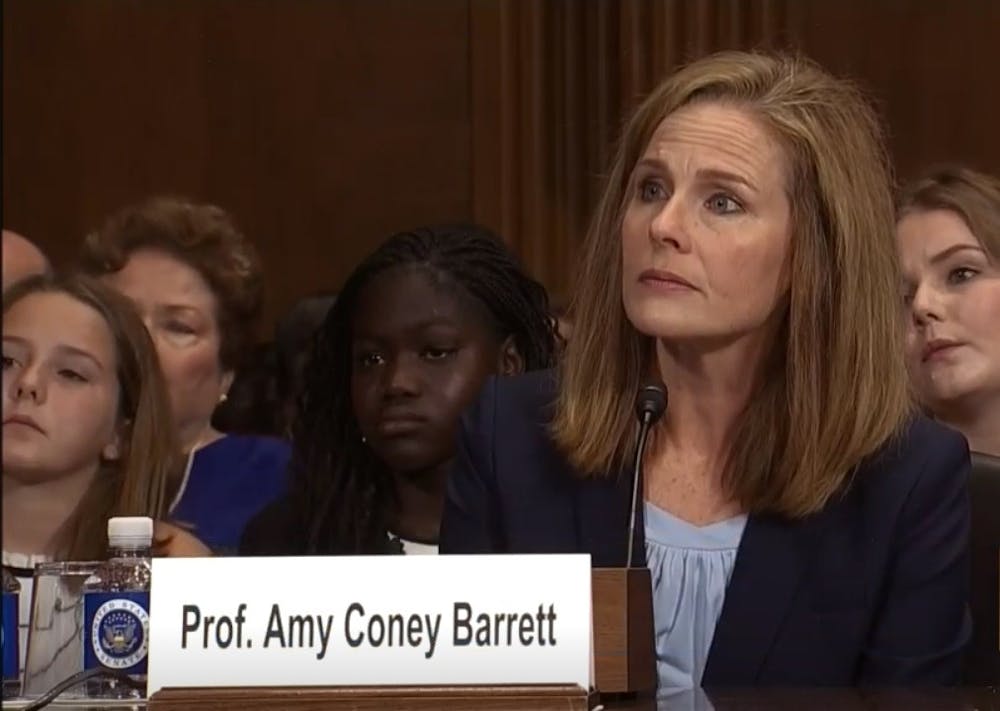Opinion Columnist Hunter Hess wrote an article for The Cavalier Daily Oct. 4 urging Senate Democrats and the rest of the nation to block the President’s Supreme Court nominee from being confirmed until after the next president takes office. In his column, Hess makes two central arguments for why the Senate should wait to fill the Supreme Court vacancy. The first is that “far-right extremist judges” would be detrimental to America. The second is that a 2020 confirmation hearing “directly violates a precedent set by Senate Republicans when they refused to hear or vote on President Barack Obama’s nominee to the Supreme Court in 2016.” Both of those points, for various reasons, are insufficient arguments for blocking President Trump’s nominee.
However, I would also raise the question — what happens if Trump wins reelection? Based on the argument, it would be preferable to wait for a White House and Senate that will confirm a more liberal justice, but that reality is not inevitable. The argument “let’s wait until our people are in charge” ignores the fact that we cannot say with certainty who will be in charge and when.
Hess claims that confirming the President’s nominee, Amy Coney Barrett, would result in a Court of “far-right extremist judges.” This hyperbolic language is a gross exaggeration. Neo-Nazis are “far-right extremists,” not judges that have devoted their lives to public service. Recklessly hurling around this epithet not only unfairly characterizes these public servants, but it also creates a “boy who cried wolf” phenomenon. Using this phrase to characterize anyone with conservative beliefs makes it weaker when applied to real Neo-Nazis.
Not only is "far-right extremist judges" hyperbolic, but it is also untrue. The most bipartisan members of the Supreme Court are Brett Kavanaugh and John Roberts, both Republican appointees. In fact, in the 2018-2019 Supreme Court term, each conservative judge joined the liberal bloc at least once in split decisions. Hess's argument seems to be based on the assumption that conservative judges would never vote with the liberal bloc, which is clearly not true.
Hess claims that Trump’s nominees — Niel Gorsuch and Brett Kavanaugh — have been “super conservative pawns.” Gorsuch, however, broke ideological ranks when he wrote the decision in a landmark ruling on discrimination on the basis of sex, a major victory for the LGBTQ+ community. Kavanaugh, though trending more conservative lately, is still seen nearly as moderate as Roberts. Conservative judges have proven that they can put aside personal choices and focus on the facts of the case. Nevertheless, Hess still asserts that Trump will have stacked the Court with “far-right” judges if Barrett is confirmed. However, it's important to note that the three Trump appointees — including Barrett — are more bipartisan than the three liberal judges.
A 6-3 ideological majority could indeed prove daunting to the left. Nonetheless, simply not liking the ideological makeup of the Court is not a sufficient reason to block a nominee. The Court does not exist to fulfill one’s partisan goals, but believing Barrett would sway the Court too far to the right justifies voting against the nominee, not delaying the vote until the next president takes office.
Now for the second component of Hess’s argument — the primary talking point of the Democrats. This argument asserts that because Republicans refused to hold a hearing or vote for President Obama’s 2016 appointee — Merrick Garland — it is hypocritical for them to confirm Trump’s nominee this year.
It is, at least, fair to quickly judge Senate Republicans as hypocritical in comparing their 2016 and 2020 actions, but that is a sword that cuts both ways. As Hess says, “It would be nice if the Republicans in the Senate would honor their own words from a few years ago and respect the institution.” This train of logic rides on dangerous tracks. The trouble lies in the statement’s converse, which would be, “It would be nice if the Democrats in the Senate would honor their own words from a few years ago and vote on the President’s nomination.”
The Democratic arguments from 2016 urging Republicans to confirm Obama’s appointee actually justify the Republican actions of today. It is inconsistent to claim that Republicans should follow their 2016 precedent while ignoring the Democratic chimes from the same time period.
If Republicans were wrong to block the nomination process in 2016, suddenly believing they should do it again is ironically hypocritical. The complaint, Hess notes, is that “Senate decorum is dead.” If Senate decorum first began dying in 2016 — when the Senate blocked Merrick Garland — then wouldn’t the Senate actually be restoring decorum by holding a vote to confirm Amy Coney Barrett? If Republicans were wrong to block the nomination in 2016, shouldn’t they now do the right thing and heed the Democrats’ advice of 2016 to hold a hearing?
I am not arguing that the Republicans are fully innocent of going back on their word from 2016. While I personally believe the situations of 2016 and 2020 are not the same — thus not directly comparable — that is for another column. What I am saying, however, is that affixing the “far-right extremist” label to a potential 6-3 conservative majority is both egregious and untrue. Further, justifying the blocking of a nominee on the basis of precedent established by Senate Republicans in 2016 is insufficient. The hypocrisy of going back on precedent here cuts both ways — when these precedents conflict, we should fall back on our laws, which give the President the job to appoint a nominee and the Senate the job to vote on them.
Cameron Cox is a third-year in the Batten School.
The opinions expressed in this column are not necessarily those of The Cavalier Daily. Columns represent the views of the authors alone.







